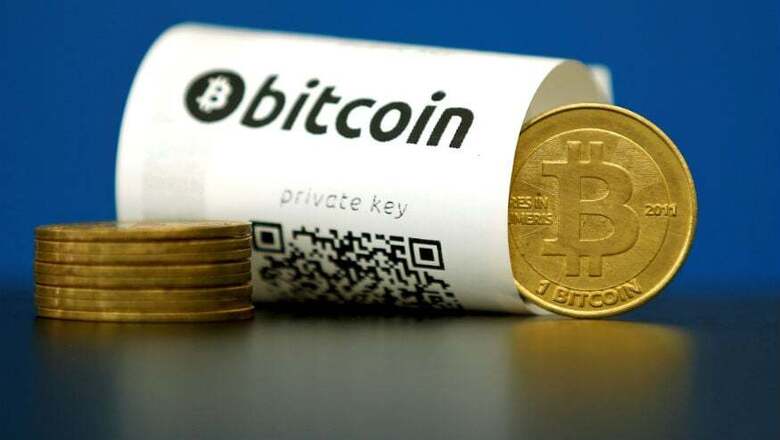
views
With the Supreme Court of India ruling to overturn the Reserve Bank of India’s directive against cryptocurrencies, stakeholders of the cryptocurrency sector in India have largely shown optimism towards embracing a new investment avenue. Startups and exchanges, which have been under lockdown and stuck in a legal battle against the RBI’s directive, are back in business, and this by itself makes for a positive impact under gloomy economic conditions. It is this that might just be the biggest win for India from the SC verdict — a new investment avenue away from the ongoing stock market volatility.
Growth potential
The swing of fortune in the Indian cryptocurrency sector is being reflected in cryptocurrency prices as well. On Monday, March 2 at 6PM IST, the price of one bitcoin was Rs 6,35,351.96. Today, at 6PM IST on March 5, the price of bitcoin had risen to Rs 6,69,550.03 — a 5.4 percent increase within a span of four days. While not being conclusive, this offers an indication of what this sector may have to offer potential investors, and the modular nature of crypto-coins is an added bonus.
As Dr. Garrick Hileman, head of research at Blockchain.com, told News18, “The argument that bitcoin and other digital assets don’t have legitimate utility and value is a harmful myth. The ecosystem of users has grown from thousands of pioneers to over 30 million people today – phenomenal growth that significantly outpaces the early internet’s growth rate (approximately 2x faster).”
He further adds, “Given India’s population of over 1.3 billion and need for more forms of accessible, digital payments, India is well-positioned to be a leading country, and possibly even the world leader, in the use of cryptocurrencies.”
Return of the investors
The opening of new investment avenues is what cryptocurrency exchanges, wallets and other facilitators in India would be looking forward to, in the coming days. Nischal Shetty, founder and CEO of WazirX, states that his company saw a near-immediate impact of the Supreme Court ruling in terms of traffic on his crypto trading platform. “What happened after the ban was the shutting down of a lot of exchanges. A lot of users stopped being involved in crypto altogether for years, due to the ban. Soon as the SC ruling came in, we saw a rush of people reactivating their accounts, by the thousands. We also had many new users signing up on our platform since many of their old platforms had shut down,” said Shetty to News18.
The big advantage now is that users can now sell their crypto investments and get the cash directly into their bank accounts.
Shetty’s startup WazirX was acquired by Binance, deemed the largest cryptocurrency exchange in the world, back in November last year. While this allowed interested individuals to transact in INR on the Binance fiat gateway, the erstwhile norms in India meant potential investors held back, despite global big guns looking at India actively. Even withdrawing money from crypto investments was a major obstacle, since direct withdrawal to banks were prohibited. “The big advantage now is that users can now sell their crypto investments and get the cash directly into their bank accounts. Previously, they had to use P2P mediums, which were three-party systems, and hence rather inconvenient,” adds Shetty.
The mood is echoed by Sathvik Vishwanath, founder and CEO of Unocoin, a leading Indian crypto trading platform. “We used to have about 25,000 active users per day, with more than 2,500 KYC (know your customer)-verified signups. We presently have 1.3 million users, and anticipate to see at least 100,000 new users every month, starting a few months from now. (In terms of active users) it would just be a matter of a few months before we start seeing similar traction (as before) again,” says Vishwanath, affirming that mainstream investment in crypto assets is not a matter of if, but when.
Safety measures
However, many experts still believe that while cryptocurrencies may be looked at by investors as a new avenue owing to the volatility in the stock exchanges today, it is crucial for potential investors to be very careful before pledging their money. While the recent upsurge of interest may see an initial boon, cryptocurrencies also have an issue of volatility of their own.
G.V. Anand Bhushan, partner and Chennai head of general corporate affairs at Shardul Amarchand Mangaldas & Co. (SAM), opines that this itself may lead to initial investment coming in only from a select few, until everyone understands the new investment arena properly. Bhushan states, “There is high volatility in the values of cryptocurrencies. For example, in the last three years alone, the value of a bitcoin has fluctuated between highs of above Rs 9 lakhs and lows of Rs 2 lakhs. I don’t see this being used by average users who have only recently discovered equities and mutual funds, and may not be comfortable with this much market volatility. Crypto is more likely to catch the attention of HNIs (high net-worth individuals) rather than the average retail investor, due to its risk profile.”
I don’t see this being used by average users who have only recently discovered equities and mutual funds, and may not be comfortable with this much market volatility.
Cyber risks play a big part in mainstream investors being wary of cryptocurrencies, and the issues are real. However, there are general guidelines that should be followed, making for good stepping stones towards building investment in cryptocurrency. Michael van de Poppe, CEO of BonSanca and a regular trader at the Amsterdam Stock Exchange, has a general advisory that everyone can (and should follow).
“Customers have to secure themselves through potential cyber security risks. This means using 2FA (two-factor authentication) for your exchanges and not using the mobile phone you regularly use — an offline phone is sufficient. The reasoning is simple — if you get sim-swapped or someone steals your phone, they have a chance to access the exchange and your funds. Further, use a complicated password, and do not use the same password for every exchange. Finally, don’t have all your coins on one exchange. This is a significant risk, as the exchange usually doesn’t provide you keys for the coins. If the exchange gets hacked, you’ll lose them. Keep a large amount of the coins outside the exchanges, on secure offline wallets,” says van de Poppe.
Making new avenues
With this ruling, India seems to be ready for promoting a new investment avenue, and stakeholders in India’s crypto story are cautiously optimistic of the opportunities that the sector represents. Unocoin’s Vishwanath is opined towards the optimistic side of the scale. He states, “There was a huge influx of users during the last quarter of 2017 and first quarter of 2018. The crypto prices also peaked out during this period and most of the investment people did got locked down as there was no bank support to liquidate it. Now the supreme court has ruled the case in the favor of industry, the crypto investors should find such investments to be both promising and liquefiable. The verdict also helps clear the uncertainty in the space which should boost the crypto adoption in India.”
SAM’s Bhushan has a more balanced outlook towards this sector, and states that there are two sides to the coin. “At its peak, it was estimated that there were over a billion dollars in monthly trades in India alone. However, the regulatory environment has stalled the growth of this space, with a number of exchanges also closing. In light of the recent judgement, and with the possibility of a more favourable regulatory regime, it will be no different for crypto or the trading exchanges as well.”
However, he also adds, “Cryptocurrencies have been used for many unlawful activities in the past, and the challenge ahead would be to strike a balance between innovation and the need to regulate these newer technologies.”
Dr. Hileman of Blockchain.com believes that both regulation and innovation in technology among India’s massive and thriving developer community would contribute towards making new avenues as far as cryptocurrencies and India are concerned. As he says, “It will be exciting to see a deeper convergence between the world of cryptocurrencies and India’s technology ecosystem. The cryptocurrency space is where new blockchain technologies are first developed and tested, and the most talented blockchain developers have gravitated to working on public cryptocurrencies like bitcoin and ethereum.”




















Comments
0 comment